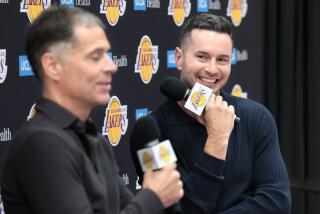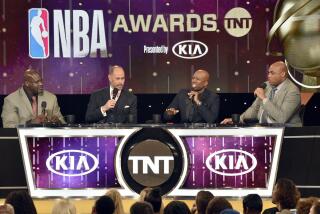Athletes turn to Twitter to get message out
- Share via
When Shaquille O’Neal wanted to set up a Twitter account after someone had impersonated him on the social media network, it was Kathleen Hessert who guided him.
The media strategist warned of one other thing.
“Twitter is immediate and without filters,” Hessert said. “There will be an athlete or coach who posts immediately in anger or in haste and gets himself in trouble. That will happen.”
Kevin Love, meet Kathleen Hessert.
Love, the former UCLA Bruin who just finished his rookie season with the Minnesota Timberwolves, tweeted the following late Tuesday night, L.A. time:
“Today is a sad day. Kevin McHale will NOT be back as head coach.”
This, Love soon learned, was news.
It was all so innocent. McHale had texted Love to tell him before word leaked out.
And Love turned to Twitter. Oops.
In a later tweet, Love almost sounded red-faced: “P.S. I am not a breaking news guy. I had no idea no one knew.”
The Timberwolves, who called a news conference Wednesday to confirm it all, were cool about it.
“I don’t want Kevin to feel badly about that,” Minnesota vice president of basketball David Kahn said. “We live in a very different world than all of us grew up in. I don’t think it’s a big deal.”
Twitter is working to be a big deal, though.
It already attracts millions of people who tweet, or write, 140 (or fewer) characters of insightful or inane nuggets that pop up on millions of cellphones and laptops.
And Twitter has turned the sports world inside out with the suddenness of a Kobe Bryant backdoor pass.
We know instantly what athletes are thinking, what owners are doing and how coaches are recruiting. More important, athletes use Twitter to control the message, if not the medium.
“My fans know what I’m doing,” said Lance Armstrong, one of the first big-name athletes to embrace Twitter. “And doping control guys know where to find me. I’m not hiding.”
When Armstrong went Twitterless for 12 hours in January, wise Australian journalists figured out he was on a plane to Australia for the Tour Down Under and several met the flight in Sydney.
“That’s pretty good,” he said.
At last month’s Giro d’Italia, the world’s most famous cyclist quit talking to the media one week into the three-week race. Instead, he sent out a dozen or more tweets each day, many with video interviews with fellow riders.
When his fourth child, son Max, was born two weeks ago, his followers on Twitter knew it almost instantly.
Not long ago, David Stern, the longtime NBA commissioner, took on a serious pose in front of a group of sports editors in New York.
“Our goal has been to be wherever our fans are, and our fans are being amassed in different areas,” he said. “We’re the biggest tweet league -- but not as big as Shaq.”
NBA: 735,485 followers.
Shaq: 1,295,250.
It’s not only that athletes and coaches and team owners have latched on to Twitter. It’s what they’re saying that offers a window into how they think.
Tennis player Andy Roddick is into Twitter. He posted, “rumor is that they are thinking of putting the super bowl in london? are u kidding me? whats next? eurocup in detroit? ridiculous.”
Funny stuff. Roddick has a sense of humor and a sense of the ridiculous and he pays attention to the world outside a tennis court.
Olympic swimmer Dara Torres tweets. “Sitn in car eatn frozen yogurt w/ m&m;’s and peanut butter chips (kinda defeats purpose of froyo!) b/4 my appearance at Borders in Dallas.”
Torres has been on a book tour and it’s kind of cool to know a world-class athlete will eat junk food like the rest of us on occasion.
But she isn’t tweeting for fun.
“My sponsors asked me to get on Twitter,” Torres said.
“Really, does anyone care what I do?”
Plenty of people seem to care that Shaq “just had a bowl of heart to heart kashi cereal, not bad, on my way bak to shaq 24 hour fitness, 8 pack here I come.”
USC football Coach Pete Carroll is an avid user of Twitter, sharing such thoughts as his song of the day -- on Wednesday it was Randy Newman’s “I Love L.A.” in honor of the Lakers -- and using his Twitter page as a recruiting tool. Ben Malcolmson of the official USC sports The Ripsit Blog, who has helped Carroll become a Twitterer and who writes some of the coach’s tweets, said the audience was “fans, friends -- and recruits.” When Carroll announces he is going to the beach in February, that might sound cool to a high school recruit in Pennsylvania.
Dallas Mavericks owner Mark Cuban is another Twitter fan, and his tweets are mostly filled with substance and immediate and emotional reactions -- and almost always worth reading.
He said via e-mail -- his favorite way of answering media questions -- that O’Neal and Armstrong have earned such strong followings “because they are very inclusive in their tweets. As new people came on, they benefited from the curiosity factor and were able to retain people’s interest.”
By this, Cuban said he meant that the two didn’t try to make their tweets too “inside cycling” or “inside basketball.”
Cuban said he isn’t surprised that it is the older athletes and not college and high school athletes who have adopted Twitter as opposed to other social networks such as MySpace and Facebook.
“Twitter is quick and easy, and more importantly, real-time broadcast to an open network,” Cuban said. “There is no limit on size while Facebook, as an example, limits the size of your network. The lack of limits is of more value to people who have entered the business world.”
And the business world has caught on.
NBA director of marketing Dan Opalo said the league created its own Twitter page as a way to help fans find games on television, give them in-game updates and alert them to developing stories.
“If Chris Paul is on his way to scoring 50 points we might send out a tweet,” he said.
TNT, with its NBA coverage, had some of its announcers twittering during the NBA playoffs, including Kenny Smith who has, as he said, “totally embraced this thing. I’m a tech guy, I want to blow it out of the water.”
And he certainly has had some fun. His Twitter name is TheJetOnTNT and he tweeted, “The commiss came by the studio early today I missed him, he didn’t wait for me.”
Hessert, the strategist who is president of Sports Media Challenge, said O’Neal and Armstrong have been successful because they have a Twitter strategy.
“Too many athletes start Twittering with no purpose in mind,” she said. “Shaq and Lance have specific goals. Twitter won’t replace traditional media. It is more a tool to let people know the real you. And the people who succeed are the ones willing to put themselves out there.”
Chuck Schilling, research director of media and analytics for Nielsen ratings, said Twitter is here to stay.
“Can there be problems? Sure,” he said. “But it is obvious from the numbers that it is appealing to everyone. Athletes especially. The ones who succeed are the ones who have a good story to tell every day.”
Kevin Love: 11,553 followers. And rising.
--
More to Read
Go beyond the scoreboard
Get the latest on L.A.'s teams in the daily Sports Report newsletter.
You may occasionally receive promotional content from the Los Angeles Times.










